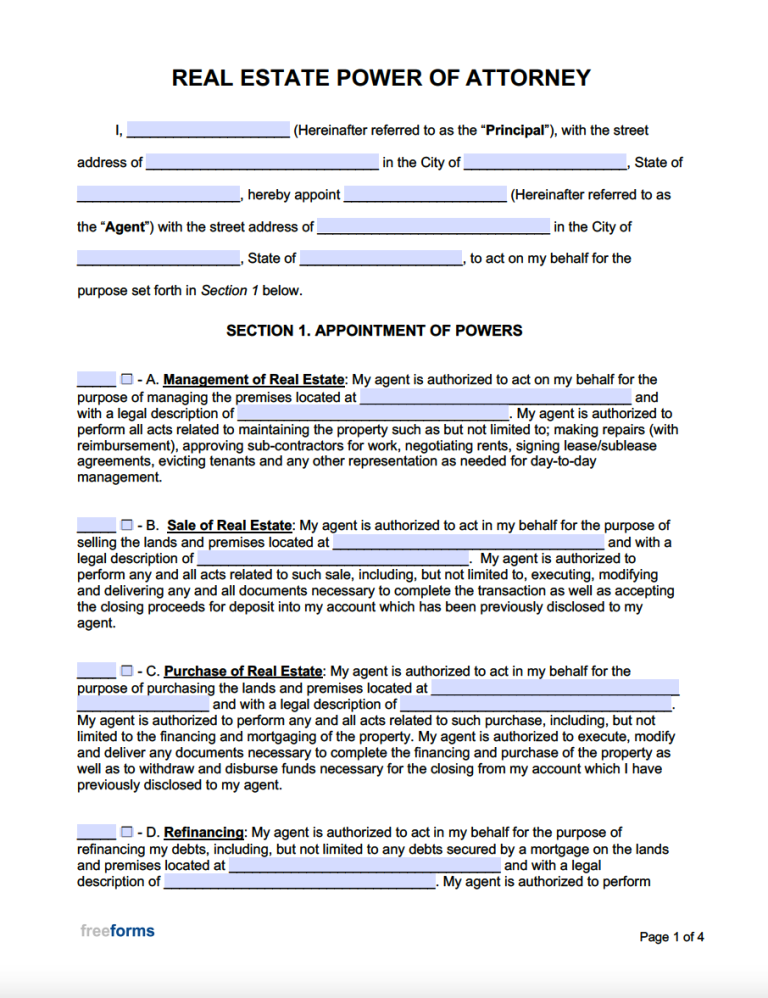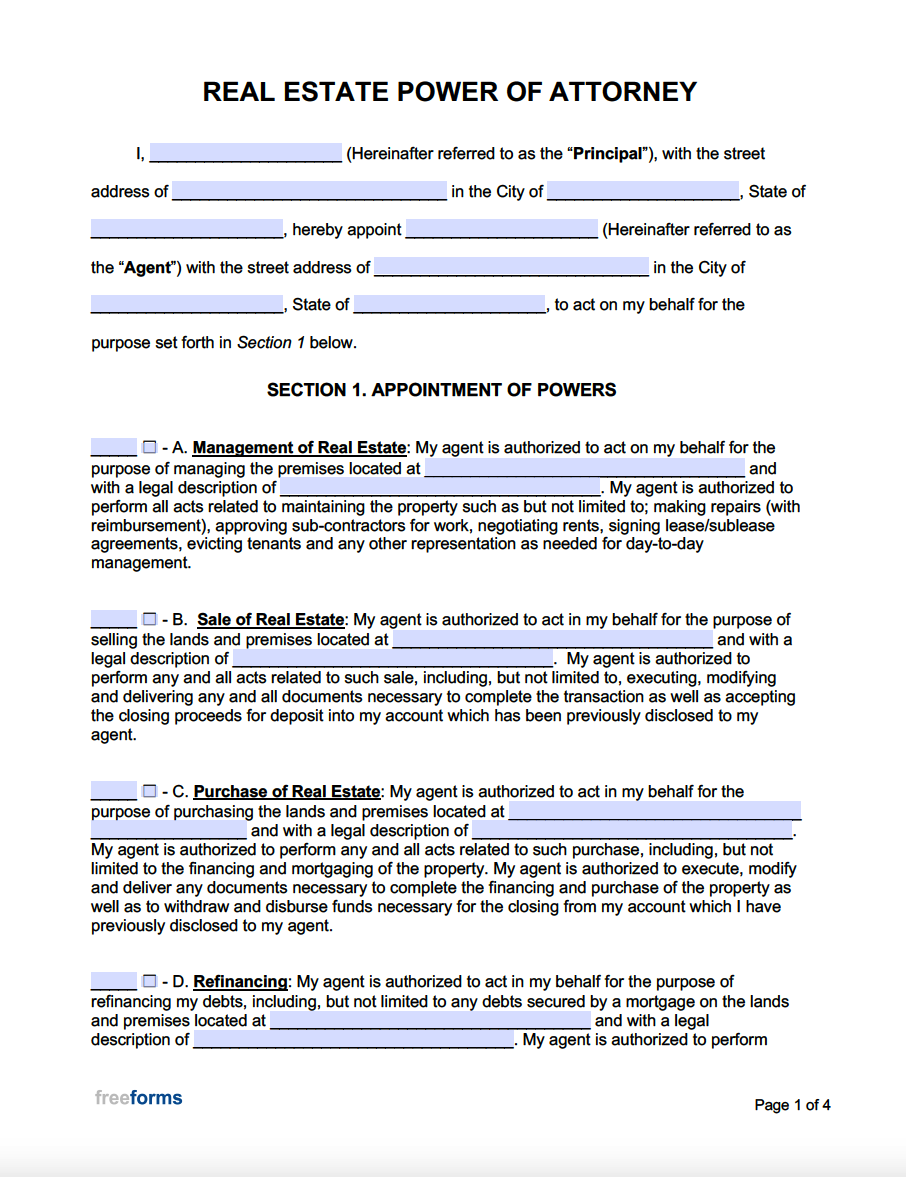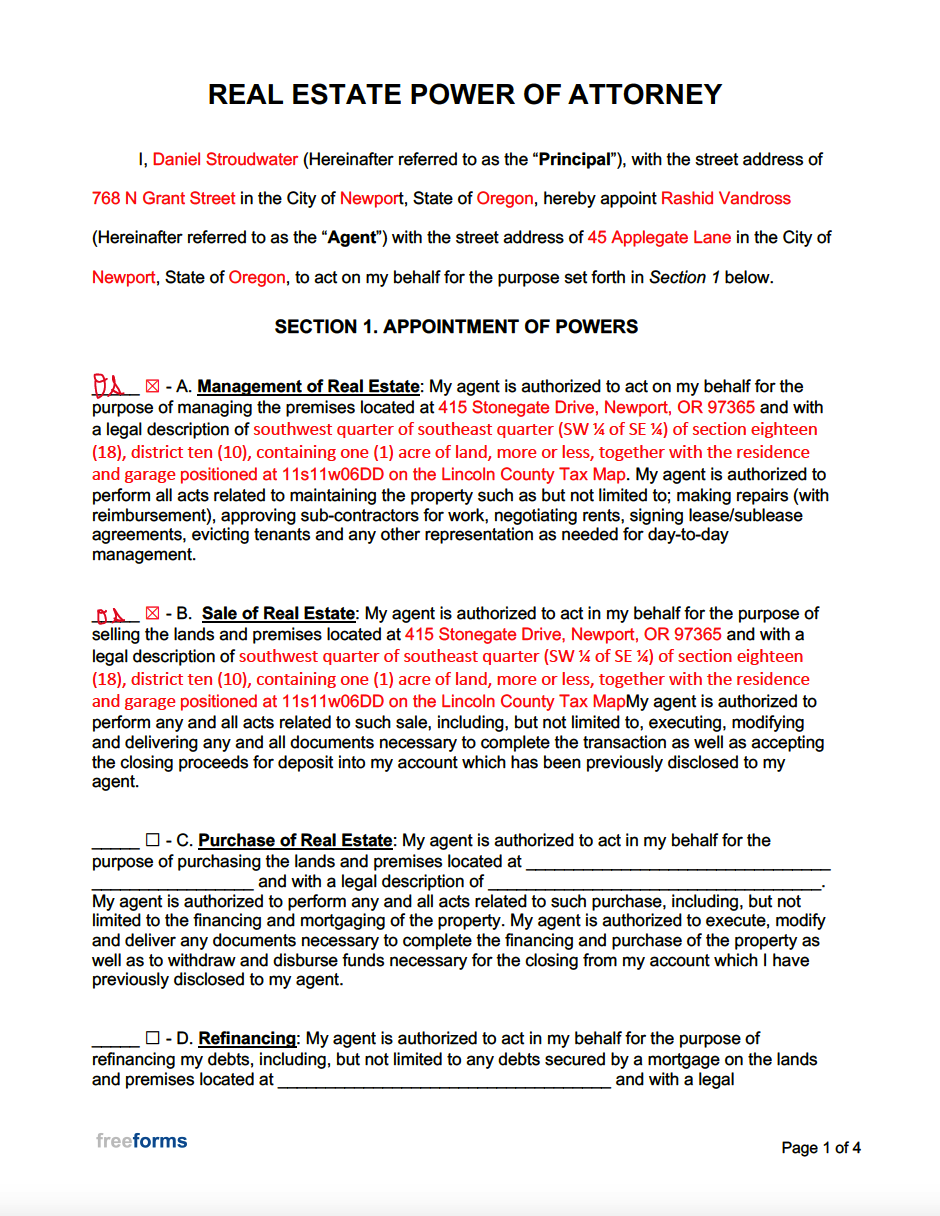By State
- Alabama
- Alaska
- Arizona
- Arkansas
- California
- Colorado
- Connecticut
- Delaware
- Florida
- Georgia
- Hawaii
- Idaho
- Illinois
- Indiana
- Iowa
- Kansas
- Kentucky
- Louisiana
- Maine
- Maryland
- Massachusetts
- Michigan
- Minnesota
- Mississippi
- Missouri
- Montana
- Nebraska
- Nevada
- New Hampshire
- New Jersey
- New Mexico
- New York
- North Carolina
- North Dakota
- Ohio
- Oklahoma
- Oregon
- Pennsylvania
- Rhode Island
- South Carolina
- South Dakota
- Tennessee
- Texas
- Utah
- Vermont
- Virginia
- Washington
- West Virginia
- Wisconsin
- Wyoming
What is a Real Estate Power of Attorney?
A power of attorney agreement essentially conveys authorized rights from one person to another within a written register. This specific POA is designed to cover distributed controls relating to a particular piece of real estate. The issuing party, recognized as the “principal” or “declarant“, can utilize the contract to pass selected inherent rights as the property owner to a designated person. The receiving individual is referred to as the “agent” or “attorney-in-fact” and is granted consent to act on behalf of the principal regarding the chosen property. Upon signing the commitment, the agent will then be able to perform assigned tasks related to the property in the owner’s absence.
A Real Estate Power of Attorney Can Permit Agency to:
- Sell a Property
- Buy a Property
- Manage a Property
- Refinance a Property
- Insure a Property
The allocation of approved controls can be extended in a limited or broad manner depending on how the declarant fills out the form. The arrangement can be beneficial when the property owner cannot be present at closing and wishes to appoint an agent to finalize the real estate transaction.
How to Use a Real Estate POA Form
- Step 1 – Select Which Powers to Endow/Set Preferred Terms
- Step 2 – Choose an Agent
- Step 3 – Complete and Sign the Form
Step 1 – Select Which Powers to Endow/Set Preferred Terms

When granting powers of attorney for real estate, the first factor to consider is which permissions will be necessary to issue. Bestowed rights can be delegated to cover a wide range of privileges or on a singular basis to meet the property owner’s needs. Transactions requiring another to sign on behalf of the principal at the closing of a real estate sale may necessitate the sole distribution of selling powers to the elected agent. Conditions that call for a more comprehensive scope of agency to be established can be confirmed by signifying authorization to cover purchase, sale, management, and mortgage of real estate in the absence of the property holder.
There are several variations of this contract type to consider when employing the use of the agreement. Incorporation of a “durability” clause can be utilized if the declarant desires for the allotted controls to remain in place even in the event of the principal’s possible incapacitation. If a designated expiry date for the arrangement is desired, an indicated start and end date can be recorded within the document. A supplemental clause can also be implemented to clarify the intended course of action for revocation at either participants’ request.
Step 2 – Choose an Agent

The authorized powers that are passed to the nominated agent can prove to have far-reaching ramifications. The receiving party will essentially be permitted decision-making authority for many of the aspects of the designated property. Therefore, it is vital to assign agency controls to a trusted individual to safeguard your asset(s) appropriately. Select a reliable candidate that can perform the required duties and make intelligent decisions that benefit your best interest.
Step 3 – Complete and Sign the Form

Once the agreement’s specifics have been narrowed down, the form can be drafted according to the predetermined options. The document can be downloaded, printed, or completed on this website using the Fill Now tool. Insert the designated selections to the appropriate spaces and review the paperwork to ensure it is assembled correctly. Review your state’s Signing Requirements made available in the table below before endorsing the agreement. Sign as directed per your corresponding state’s statute, and make sure to provide the designated agent with a copy of the executed arrangement. The principal should secure the original filing for reference purposes.
Signing Requirements and POA Laws by State
How to Revoke Real Estate Powers of Attorney
After a power of attorney has served its purpose, and the instated controls are no longer needed in the eyes of the issuing principal, cancelation of the arrangement can be invoked. Alternatively, scenarios may arise where the attorney-in-fact wishes to withdraw from the commitment, wherein communication of the request can be asserted to the declaring party to start the process. Depending on the specific provisions and contract type, revocation can be brought about in a number of ways.
The terms to the majority of POAs typically expire upon the death of the issuing declarant, effectively reversing the bestowed authority. Although durable POAs will endure past the point of the principal’s incapacity, they too can be dissolved at the behest of either party.
Contracts containing stipulated revocation clauses may cover the proposed protocol for the annulment of agreement. In cases where the specific revocation procedure is not mentioned in the POA document, the principal can seek to void by executing a Revocation of Power of Attorney Form. Completion and execution of the Revocation POA will terminate the previous accord. It is advised that the principal retain the original revocation paperwork and provide a copy of the installment to the named agent.
Sample Real Estate Power of Attorney
Download: Adobe PDF, MS Word (.docx)


